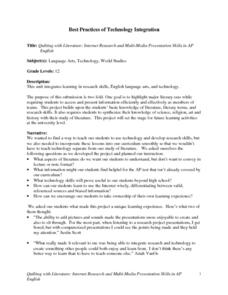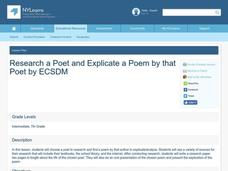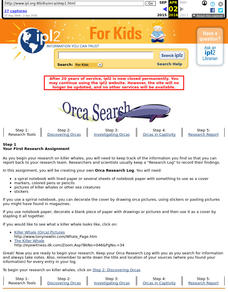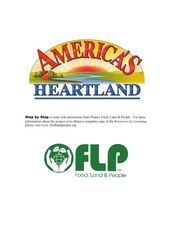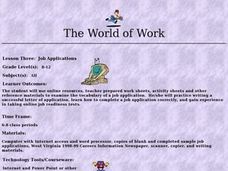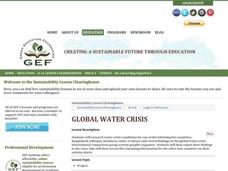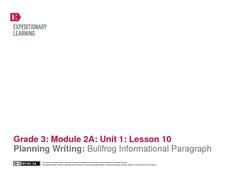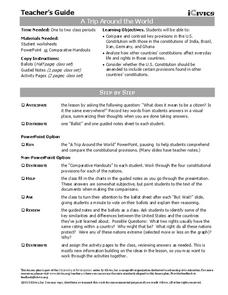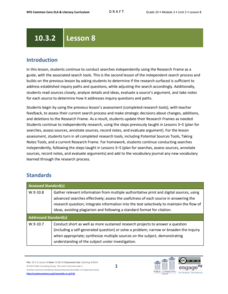Curated OER
Mesearch: A Reason for Research
Students complete a research activity about themselves. They access an article on brainstorming and identifying personality traits. Students brainstorm about their personality traits and view a related PowerPoint. Students create their...
Curated OER
Quilting with Literature: Internet Research and Multi-Media Presentation Skills in AP English
Have your class acquire research skills such as using hotlists and evaluating websites while they study major literary eras. They create multimedia presentation using information from the Internet research.
Curated OER
Why is The Sky Blue?
Students explore why the sky is blue. In this light lesson, students conduct an experiment using water, flashlights, and milk to test why the sky is blue. Students view a PowerPoint, take notes on their results and draw conclusions.
Curated OER
Research a Poet and Explicate a Poem by that Poet
Seventh graders choose a poet to research and find a poem by that author to explicate/analyze using a variety of sources for their research that will include their textbooks, the school library, and the internet. After conducting...
Curated OER
Building Biographies: A Research Unit
Students explore the fundamental principles involved in completing a research project. Several handheld technical pieces of equipment are utilized to complete this activity.
Curated OER
Researching Orca Whales
Students research orca whales as they begin to create a research report. Guidelines for research are provided, as well as photos, websites, etc.
Curated OER
Step-By-Step
For many emerging writers, essays are completed step-by-step. With the help of this lesson plan, learners will narrow down a topic, develop a thesis statement, develop a preliminary outline, conduct Internet research, and understand the...
Curated OER
Researching Chocolate
Learners work in groups to research one part of the chocolate processing procedure. They will publish a written report to present to a younger class.
Curated OER
The World of Work: Job Applications
Students use online resources and activities to examine the vocabulary of a job application. In this job application activity, students review and take sample online job readiness exams. Students read a publication about completing a job...
Curated OER
What Can You Find in the Cabinet?
Looking in the cabinet can be fascinating! Examine the various departments of the Executive Cabinet in this group research project, which jigsaws so each small group has a different department and presents to the class. Groups create...
Curated OER
Global Water Crisis
Assign ecologists one of five countries that struggle with access to clean water. They research the water crisis in that country and then present information to classmates. A handout was designed for each country, and a worksheet on...
EngageNY
Planning Writing: Bullfrog Information Paragraph
Lesson ten in this unit for the book Bullfrogs at Magnolia Circle, prepares third graders to begin writing an informational paragraph about the adaptations of bullfrogs. First, young writers work either independently or in pairs to...
Curated OER
All Americana
Fifth graders research American landmarks and symbols. In this United States history lesson plan, 5th graders create a KWL chart about the symbols of America and take notes during a PowerPoint presentation. Students complete the rest of...
iCivics
A Trip Around the World
How do the rights of citizens in other countries, such as India, Germany, Brazil, and Iran, compare to those of Americans? Take a closer look at the provisions of various foreign constitutions, and compare and contrast the protections...
ARKive
Temperate Rainforest in the Pacific Northwest
Explore the amazing temperate rainforest of the Pacific Northwest. Your class starts by investigating the animals and plants of the Northwest, specifically Washington, and then research an animal population common to the area. In small...
California Department of Education
Possible Careers
Is a STEM career the right choice for me? Lesson four in a six-part career and college readiness series introduces seventh graders to the world of STEM occupations. Individuals use their Holland code results to select, research, and...
EngageNY
Introducing Module 4B: “Water Is Life”
Learners take a gallery walk around the classroom to view various images and quotes. As they walk, they write down what they notice and wonder about what they see. After discussing their notice and wonder notes, they read the...
Curated OER
Light and Elements
Here is a full-fledged investigation of light waves, the electromagnetic spectrum, and element spectra. Physicists research a scientist that contributed to our understanding of the behavior of light. They take notes on your lecture, and...
West Contra Costa Unified School District
Introduction to Conditional Probability
Here is a turnkey instructional activity that walks young statisticians through the development and uses of conditional probability. From dice games to surveys, Venn diagrams to frequency tables, the class learns how a given can effect...
NOAA
Technology I
Isn't technology great? The 12th installment of a 23-part NOAA Enrichment in Marine sciences and Oceanography (NEMO) program introduces technology that marine scientists use. Pupils take part in an activity using conductivity,...
EngageNY
Why Were Logarithms Developed?
Show your class how people calculated complex math problems in the old days. Scholars take a trip back to the days without calculators in the 15th installment of a 35-part module. They use logarithms to determine products of numbers and...
EngageNY
Grade 10 ELA Module 3: Unit 2, Lesson 8
Take it one step at a time. Scholars use the steps learned in lessons three through five to guide their independent research. While using the steps, learners complete research tool organizers to record their thinking, sources, and...
EngageNY
Local Sustainable Food Chain: Determining Cascading Consequences Using The Omnivore’s Dilemma
What are the consequences of the local, sustainable food chain? Research teams explore the question as they review Michael Pollan's The Omnivore's Dilemma. The teams complete Cascading Consequences charts and then choose research topics...
Teach Engineering
Clean it Up!
Harness the power of bacteria. Scholars see how using organisms that exist in nature can help solve human problems in the process known as bioremediation. They research and discuss several successful examples, such as using oil-eating...



